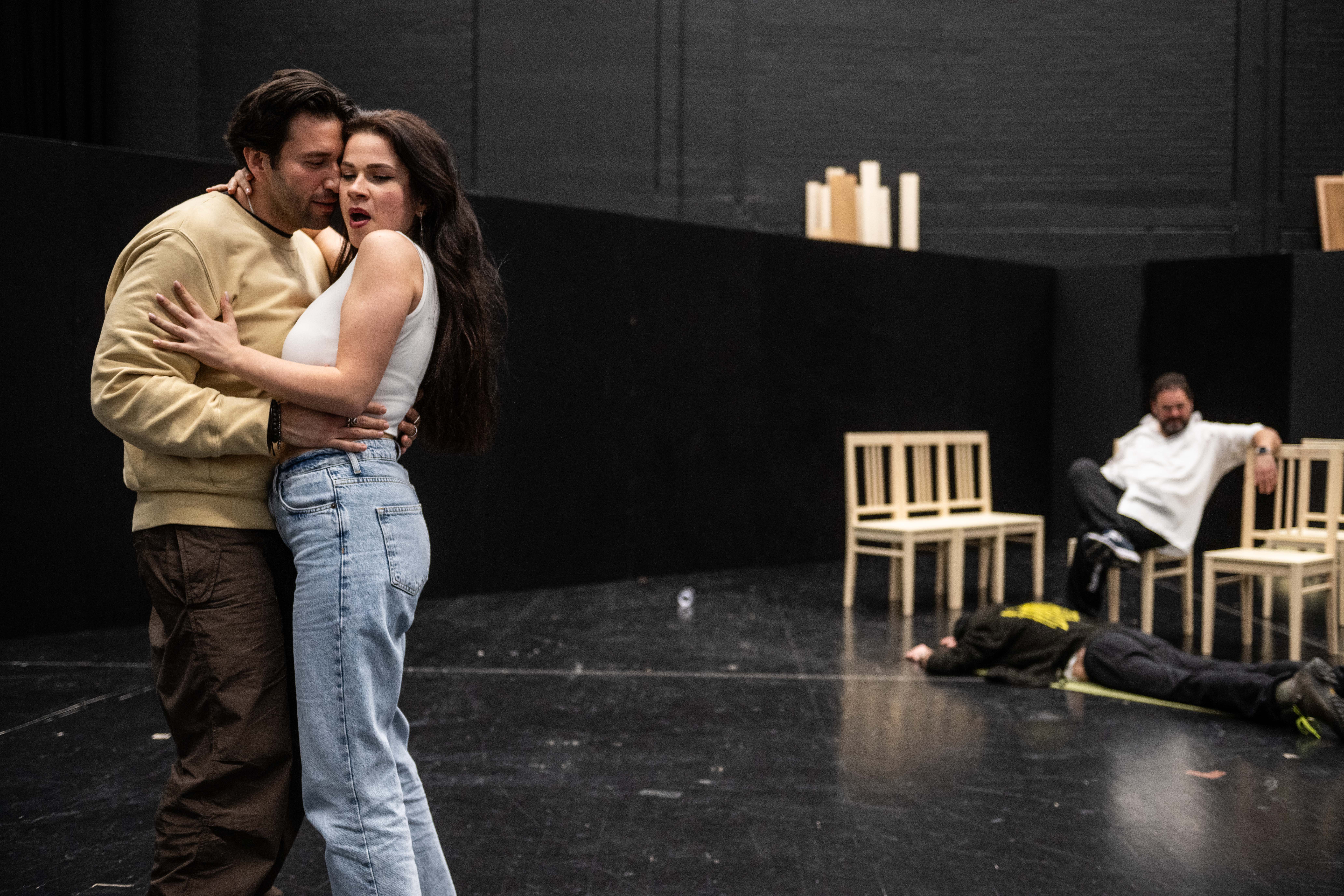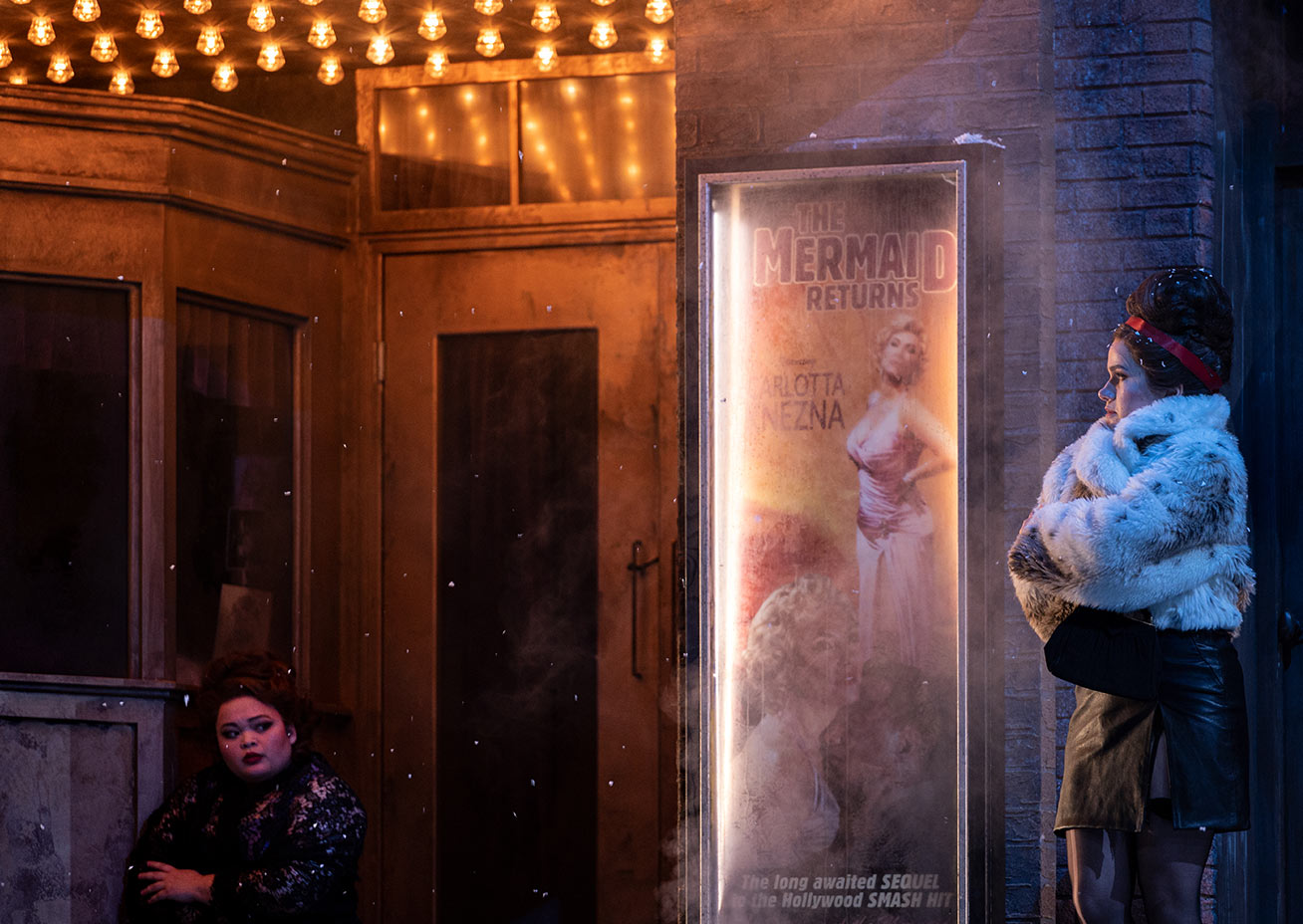
Inna Demenkova, alumna of Dutch National Opera Studio, returns for Il trittico
Inna Demenkova is a young Russian soprano who was a member of Dutch National Opera Studio during seasons 2021-22 and 2022-23. She is returning to Amsterdam for Puccini’s Il trittico, singing Amante in Il tabarro, Suor Genovieffa in Suor Angelica, and – most importantly – Lauretta in Gianni Schicchi.
Author: Bo van der Meulen
How are rehearsals going?
Inna Demenkova: ‘They’re going great! I feel very fortunate to be able to sing these pieces, and to work with an accomplished musician such as Lorenzo Viotti and a top-class stage director like Barrie Kosky. They really work as a two-man team and it’s wonderful to see how they probe and challenge each other at every turn: “why the slow music here, why the long pause there?” I’m seeing how important it is for the stage director to have a profound understanding of the music, besides obviously the conductor knowing the music through and through. I’m working with two geniuses and I love it.’
‘Of course I’m pretty tired – I’m performing in all three operas (Il tabarro, Suor Angelica and Gianni Schicchi) – but in a good way in that I feel fulfilled after every rehearsal. There’s so much information going through my head, about the staging, about the colouring of my voice, and stuff like that.’
Ah yes, colouring. I wrote about that before when I’d heard you perform as a member of the Opera Studio.
‘I think a lot about adding the right colouring to my voice. Clearly, I need to sound as unaffected as possible, but when I go on stage, I’m not Inna Demenkova. It’s important for me to know where my character is coming from and where she’s headed. I always delve into the soul of the character I embody. I need that to fully inhabit my role and bring it to life in my singing. For me, that’s what it’s all about and that’s why I love working with Barrie. He’s a brilliant stage director and his musicality is amazing. He’s full of inspiring ideas. I admire that a lot. I love experimenting and trying out different things. He’ll say: “Okay, that doesn’t work for you, let’s try it this way…”. He’ll give me different options and suggestions. To me, that’s a great way to work.’
Inna Demenkova
‘Dutch National Opera has become my second home’
Let’s go back to when you first came to Amsterdam in 2021 to join the Opera Studio. Those were difficult times.
‘Yes, you’re right. It was the height of the pandemic and the world was complicated. I know I’m still young, but I also know that adversity makes me stronger. Navigating challenges helps me grow and learn. I admit that the first few months in Amsterdam were pretty tough for me mentally. Everything was different, I had to get used to a whole different way of communicating. In Russia, discipline is everything: it’s discipline, discipline, discipline. And you’re expected to work non-stop. I’m now at a point where I’ve learned to practise self-care, and to protect myself and my voice. Sometimes I tell myself: “Slow down, Inna!” Those tough times helped me find myself and understand what makes me tick. It’s easy to lose yourself in working hard. The Opera Studio taught me how important it is to make time for your voice and your mental health. That’s why I love Amsterdam: Dutch National Opera has become my second home.’

When you were a member of the Opera Studio, you played a number of roles, including a lead role in the opera Denis & Katya, which was performed at the Opera Forward Festival in 2022. That was a gut-wrenching opera. What kind of support did the Opera Studio offer to help you cope with the demands of your role?
‘It’s true that that was a hard-hitting opera. We worked on it for about an entire year. I’m a very emotional person, so I don’t need much help tapping into my feelings. But here’s the thing: your own emotions have to take a backseat. The emphasis should be on your character’s emotions. You need to set emotional boundaries to protect yourself. We had many coaching sessions with Rosemary Joshua and with Sjaron Minailo too. They had us do all kinds of different exercises. We talked about separating personal emotions from the demands of the character and the Opera Studio gave us exercises to cultivate our emotional resilience. If the music’s sad, that doesn’t mean you have to be sad. You don’t have to cry, it’s the audience that should be reduced to tears. But honestly you don’t really learn these things until you start performing; they’re difficult to emulate in a classroom or a studio. Only when you’re in an actual production do you realise what it means to be on stage with so many people, the orchestra, the chorus, the singers, the sets and the costumes, and to be part of bringing everything together into a unified and compelling performance.’
Inna Demenkova
‘The most important lesson my time at the Studio taught me is to never stop studying, to keep learning’
‘To me, my time at the Opera Studio represents a different life; it was colourful and a little crazy. And I mean crazy in a good way: one time, I was asked to step in at The Concertgebouw at the last minute, for instance. The most important lesson my time at the Studio taught me is to never stop studying, to keep learning. It’s like having a giant box for storing everything you learn. A new conductor, a new work, experience after experience. And once you’ve left the Studio and you start out as a freelance opera singer, you open that box and you look for the right emotion, the right lessons and the exercises that are helpful at that particular time.’
So I gather it’s very special for you to be back with Il trittico to sing what’s perhaps the most well-known aria ever, ‘O mio babbino caro’ in Gianni Schicchi:
‘I don’t focus on that one aria. I look at the role in its entirety, at how Lauretta manipulates her father. The father-daughter relationship somehow feels Russian to me. That’s why the role of Lauretta resonates with me personally. She’s young and self-aware, so she’s in a perfect position to manipulate her father. She knows how much her father loves her and wants to protect her. When I sing: “Babbo pietá”, his answer will undoubtedly be “Sure, sweetheart, do whatever you want”.’

‘After singing Lauretta, I’m hoping to branch out. I’ll be returning to Amsterdam as Xenia in Boris Godunov, that’s for sure, and I’d like to sing more belcanto roles. I’ve been cast in the role of Fiorilla in Il turco in Italia at Glyndebourne, but I want more. Maria Stuarda, Anna Bolena and perhaps more Verdi. I'm thinking I masnadieri and Simon Boccanegra. But I’m interested in Mozart too: Susanna and Donna Anna. And I really love contemporary repertoire as well.’
You have options galore, such a broad repertoire in so many languages. I hope you’ll return to the Netherlands often.
‘I hope to perform with Dutch National Opera many more times. Like I said, it feels like my second home. I enjoy working with the people here: the chorus members and the orchestras. I know what I have to do: work really hard and take good care of my voice. I adore my job. I love the creative process and being part of a team. But first: the premiere of Gianni Schicchi and my roles in the other two operas of the triptych of course. I foresee fireworks! And I love it!’